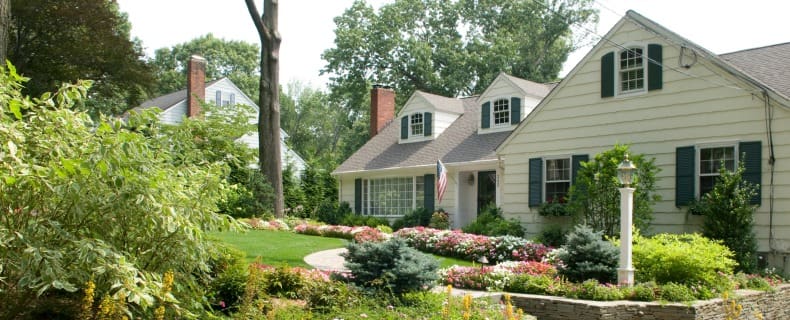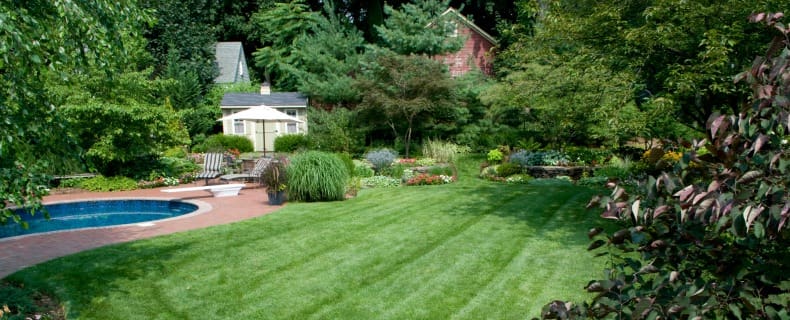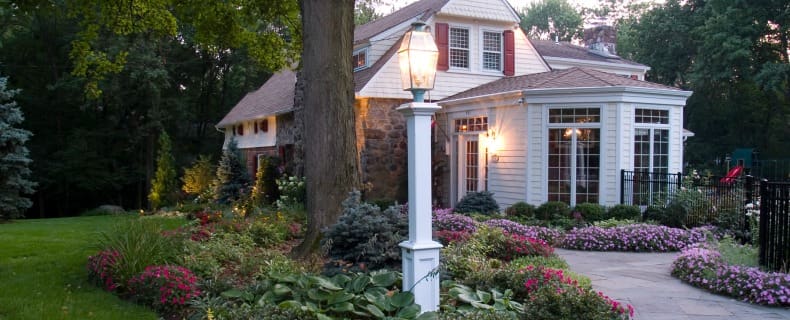Keeping a beautiful lawn and landscape year-round requires hard work and dedication. It’s more than just mowing the lawn and raking the leaves on occasional weekends. Good lawn and landscape maintenance in NJ requires knowledge about grass and plant care, maintenance procedures and the use of lawn care products. Unless you have the time for year-round lawn care and maintenance, it’s best to hire a professional landscape company with proper knowledge, skill, experience and equipment.
Provide Regular Lawn Care and Maintenance
One of the most important ways to keep your lawn beautiful is to provide regular lawn and landscape maintenance in NJ. A well-maintained property will make your grass, plants, shrubs and trees stronger and more resistant to lawn diseases and outdoor insects and pests that cause damage. If you’re handling your own lawn care, you may want to consider hiring a professional lawn care company that will provide weekly lawn care services for your home. With professional lawn care, an experienced crew will be assigned to your home to take care of all of your landscaping needs as scheduled, so you won’t have to worry about your lawn care. Typical services include:
- Weekly lawn mowing
- Regular weeding
- Border edging for driveways, sidewalks and walkways
- Cleaning of all hardscaped surfaces like driveways, walkways and patio areas
- Spring cleanup to remove yard debris and dead winter growth
- Fall cleanup to remove dead summer plants and yard debris and prepare for winter

Do a Soil Test
The texture and pH balance of your soil has a big impact on grass and plant growth, irrigation and drainage and lawn care and maintenance requirements. Sandy soils drain very quickly, so they don’t absorb water or nutrients well. Silty soils have a smooth, slippery texture, so they promote drainage and hold some nutrients. Clay soils are sticky when wet, so they absorb water and nutrients well, but don’t drain well. A soil test will help you choose grass, plants, shrubs and trees that will thrive in your existing landscape conditions.
Testing for the pH balance of your soil will let you know if you’re working with alkaline or acidic soil conditions. You can purchase a soil test kit at a local home improvement store or nursery and do your own soil test, or contact a landscape professional to do the test for you. If you hire a landscape company for regular lawn and landscape maintenance in NJ, a soil test can be included as part of your regular service. The best time to do a soil test is in April or May, when the ground has warmed up and the last signs of frost are gone.
Plant the Right Type of Grass
If you want a lush, green lawn year-round, it’s important to plant the right type of grass for your climate and weather conditions. Seasonal temperatures, soil conditions, and light have a big impact on the root systems and growth patterns of your grass, plants and trees. Turf grass is divided into two categories – cool-season grasses and warm-season grasses.
- Cool-Season Grasses – Cool-season grasses grow during the fall, winter and early spring. They prefer cooler temperatures, moist air and wet winters. They thrive in Northern NJ lawns where winters bring lots of rain, snow and ice. They grow best in areas with at least 30 inches or more of yearly rainfall. Cool-season grasses like Kentucky bluegrass, perennial ryegrass, bentgrass, fine and tall fescue and wheat grass are common in Bergen County lawns.
- Warm-Season Grasses – Warm-season grasses grow during late spring and summer. They are typically found in the southern and western regions of the country where temperatures are temperate and mild year-round. They prefer hot, humid and dry spring and summer temperatures and mild, cool winters. They grow best in areas with 20 inches or less of yearly rainfall. Warm-season grasses like zoysia, Bermuda grass, buffalo grass and St. Augustine grass are not typically found in Northern NJ lawns.
If you want to lay new sod with a cool-season grass, most common in New Jersey, early fall is the best time of year. In September, temperatures are beginning to cool down, but the ground is still warm. It’s important to lay new sod before cold weather arrives, so grass roots can take hold in the soil. Cool-season grasses will germinate when soil temperatures range from 50 to 65 degrees Fahrenheit, and daytime temperatures range from 60 and 70 degrees.

Use Proper Mowing Techniques
Top lawn experts agree that mowing techniques have a big impact on lawn and landscape maintenance in NJ. Improper mowing is one of the most common causes of lawn damage. Regular, proper mowing will promote thicker turf and stronger grass roots. It will also remove any damaged or brown grass tips and and prevent weed growth and lawn diseases. Proper lawn mowing has a big impact on your lawn’s appearance and health.
Proper mowing techniques include mowing at the right height and mowing in the right direction.
- Grass Height – Each time you mow your grass, it actually shocks the grass, so you should leave it tall enough to maintain healthy roots and short enough to look well-manicured. As a general rule, only take off one-third of the grass blade height with each mowing.
- Mowing Direction – Don’t mow your lawn in the same direction each time, because this can compact the soil and cause grass to lean and grow in the direction it was mowed. By mowing in a different direction each time, your grass with grow taller and more upright.
- Overgrown Lawns – If your lawn is overdue for a mowing and has become long and overgrown, don’t try to mow it down all at once. This puts stress on grass and grass roots and can cause your grass to die. Remove only one-third of the grass height, let the grass recover for three or four days, then take off another one-third of the height.
- Wet Grass – Don’t mow your lawn when the grass is wet. Mowing wet grass causes an uneven cut that will result in a messy looking lawn. Wet grass clippings will also clog your lawn mower quickly and cause more frequent lawn mower maintenance for blades and parts.
Provide Proper Irrigation
Water is essential to all lawns and landscape plants, but too much or too little water can cause damage. Frequent, light watering can cause your grass to grow shallow, weak roots which creates growth problems, especially in the spring and summer sun and heat. Over watering can set up a perfect environment for insects like sodworms, grubs and slugs that cause lawn diseases. Proper irrigation will impact your lawn and landscape maintenance in NJ. In general, your lawn needs about one-inch of water every week which can come from your sprinkler system or natural rainfall. Here are some helpful watering tips to provide proper irrigation:
- Deep, infrequent watering is better than light, frequent watering.
- Avoid watering during the hottest part of the day, between 11 am and 3 pm.
- Water in the morning between 6 am and 10 am, when there’s less sun, heat and wind.
- If you can’t water in the morning between 6 am and 10 am, water between 4 pm and 7 pm.
- Don’t water at night, as it promotes mildew, fungal diseases and outdoor insects and pests.
- Sprinklers don’t always distribute water evenly, so check lawn and landscape areas for even watering that may show up as soggy grass or pools of standing water.

Aerate Your Lawn
For a green, healthy lawn, lawn aeration should be part of your regular lawn and landscape maintenance in NJ. Lawn aeration, punching small holes in the soil or removing plugs of grass, allows air, water and nutrients to penetrate the soil and grass roots. It promotes deeper root growth and thicker, stronger grass and reduces soil compaction that prevents healthy grass growth. Cool-season grasses, found in Bergen County, should be aerated in early fall since grass growth is most abundant during fall, winter and early spring. Lawn aeration can be done with a spike aerator or a plug aerator, but plug aerators are usually more efficient. You can aerate your lawn yourself, but you need adequate time and the right equipment. For best results, it’s better to hire a landscape professional with aeration knowledge, experience and proper equipment for lawn and landscape maintenance in NJ.
Fertilize Your Lawn and Landscape
All lawns need proper nutrients to stay healthy, lush and green. It takes a lot of energy for your grass to develop strong, healthy roots and green growth. Most soils lack adequate nutrients for healthy, strong plant growth, so proper fertilization throughout the year is essential. There are six primary nutrients that plants require. They get the first three – carbon, hydrogen and oxygen – from air and water. They must get the other three – nitrogen, phosphorus and potassium – from the soil or applied fertilizers. Regular fertilization will stimulate grass growth and help your lawn fight environmental stresses like cold, heat, drought, lawn mowing and foot traffic.
Choosing the right type of fertilizer and proper fertilization schedules are essential for a healthy, thriving landscape. Using the wrong fertilizers and fertilizing at the wrong time of year can burn or kill your grass, shrubs and trees. A lawn and landscape maintenance professional can answer any lawn care questions about the best types of fertilizer for your grass type.
Control Weed Growth
Weeds fall into two main categories – broadleaf weeds and grassy weeds. Broadleaf weeds have wider leaves and include varieties like dandelions, chickweed, purslane and clover. While some broadleaf weeds may flower and look like pretty plants, they’re still weeds. Grassy weeds, like crabgrass, can quickly take over your landscape before you even realize there’s a problem. One of the problems with grassy weeds is that they grow under the very same conditions as regular grass, so treating your lawn could end up growing the weeds as well. There are hundred of weed varieties common to Northern NJ, so weed control is essential. It’s important to include a pre-emergent herbicide in early Spring since weeds grow most abundantly in the Spring and Summer. Talk to your lawn care professional about lawn and landscape maintenance in NJ that includes regular weed control.

Eliminate Outdoor Insects and Pests
Professional lawn and landscape maintenance in NJ will keep your property looking its best, but you will need regular pest control to prevent lawn and landscape damage from harmful insects and pests. . Not all insects and pests cause damage, but those that do can destroy your grass, plants and trees rapidly. Small insects like fire ants, aphids, caterpillars, mealybugs and beetles can invade your lawn, and hard-to-see insects that live underground like sodworms, grubs, wire worms, webworms and slugs can invade your soil. Once this happens, it’s difficult to get rid of them without the use of herbicides, fungicides and pesticides. To keep your lawn green and healthy year-round, pest control should be a part of your regular lawn care services
An Integrated Pest Management Program (IPM) focuses on safe, gentle pest control solutions that keep your lawn and landscape insect and pest free. If you have existing insect and pest problems, a professional lawn care specialist in NJ can identify the pests and offer the right pest control solutions to clear up the problems. An Integrated Pest Management Program usually includes:
- Property visits from an IPM specialist throughout the year.
- Inspections during each visit to check your lawn, shrubs and trees for harmful insects and pests.
- Reports after each inspection detailing insect and pest problems that were found and the treatments that were used.
Invest in Organic Lawn Care
Many homeowners are interested in organic lawn care to provide a chemical-free outdoor environment for their family and pets. A lawn care company that provides organic lawn care can provide a chemical-free outdoor environment for your home. It’s a great way to take care of your lawn and landscape with natural, organic solutions and treatments. Organic lawn care will encourage strong grass root growth and healthy, green grass without any toxic chemicals. The use of organic compounds will help to establish a natural ecosystem that improves the soil, prevents week growth and discourages lawn diseases.
Organic care is also available for your shrubs and trees. Organic fertilizers will promote stronger, year-round foliage growth with more protection against insects, pests and fungal diseases that often attack shrubs and trees. Shrubs and trees will grow faster and withstand the stress of Northern NJ temperature and climate changes much better. Talk to a qualified, Bergen County lawn care professional about the many benefits of organic lawn and landscape maintenance in NJ for your home. Applications are typically done in the spring, summer and fall.
